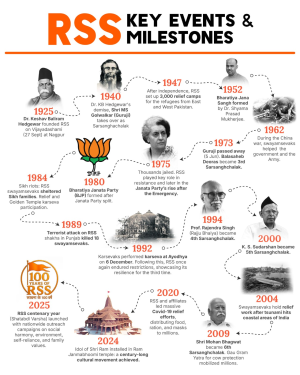In India, celebrations are starting to mark the centenary of the Hindu nationalist RSS. The Rashtriya Swayamsewak Sangh movement has become increasingly powerful over the last few years, and many fear it could endanger India's secular character.
A hundred years ago, on the sacred occasion of Vijayadashami, the Rashtriya Swayamsevak Sangh was founded. This was not the creation of something entirely new. It was a newer manifestation of an ancient tradition, where India’s eternal national consciousness expresses itself periodically, in different forms, to face the challenges of the times. In our times, the Sangh is the embodiment of that timeless national consciousness. It is the good fortune of our generation of swayamsevaks that we are witnessing the Sangh’s centenary.
On this historic occasion, I extend my greetings to the countless swayamsevaks who remain dedicated to the pledge of serving the nation and its people. I also bow in reverence to the founder of the Sangh, our guiding ideal, Param Pujya Dr Hedgewar Ji. To mark this glorious journey of a hundred years, the Government of India has released a special postage stamp and commemorative coin.
Human civilisations thrived on the banks of great rivers. Similarly, countless lives have flourished due to the impact of the Sangh. A river enriches each part of the land that it touches with its waters. Likewise, the Sangh has nourished every part of our nation, every sphere of our society. A river often multiplies into many streams and expands its impact. Something similar has happened in the Sangh’s journey. Through its various affiliated organisations, the Sangh works in every domain of life, such as education, agriculture, social welfare, tribal welfare, women’s empowerment and more. Though diverse in their fields of work, they all embody one spirit and one resolve: ‘Nation First’.
After 100 years of strengthening nation’s soul, RSS journey into next century begins: PM Modi
A hundred years ago, on the sacred occasion of Vijayadashami, the Rashtriya Swayamsevak Sangh was founded. This was not the creation of something entirely new. It was a newer manifestation of an ancient tradition, where India’s eternal national consciousness expresses itself periodically, in different forms, to face the challenges of the times. In our times, the Sangh is the embodiment of that timeless national consciousness. It is the good fortune of our generation of swayamsevaks that we are witnessing the Sangh’s centenary.
On this historic occasion, I extend my greetings to the countless swayamsevaks who remain dedicated to the pledge of serving the nation and its people. I also bow in reverence to the founder of the Sangh, our guiding ideal, Param Pujya Dr Hedgewar Ji. To mark this glorious journey of a hundred years, the Government of India has released a special postage stamp and commemorative coin.
Human civilisations thrived on the banks of great rivers. Similarly, countless lives have flourished due to the impact of the Sangh. A river enriches each part of the land that it touches with its waters. Likewise, the Sangh has nourished every part of our nation, every sphere of our society. A river often multiplies into many streams and expands its impact. Something similar has happened in the Sangh’s journey. Through its various affiliated organisations, the Sangh works in every domain of life, such as education, agriculture, social welfare, tribal welfare, women’s empowerment and more. Though diverse in their fields of work, they all embody one spirit and one resolve: ‘Nation First’.












